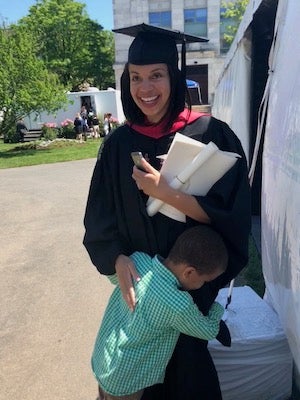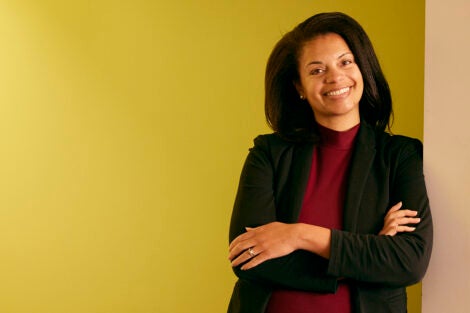Elizabeth Perry, DrPH ’23, uses her communication skills and behavioral science training to help people thrive
March 7, 2023 – Elizabeth Perry can vividly recall how, as a third grader, she marched proudly into her elementary school library clutching her book of original poetry, which she’d printed out on her dad’s computer and bound in red construction paper. She presented it to the librarian and said, “I have just put this together, and if you’d like to make it available to other students, here it is.”
Smiling as she recalled the moment, she said, “They very kindly humored me and put it on display.”
Perry’s childhood love of reading and writing has stuck around. “I’ve always been fascinated by words and how to put things together in a way that garners attention and that is interesting and connects with people,” she said. That passion led her first to a journalism career, and later to roles in federal agencies in which she used her communication chops to help people thrive—both in health and in other ways.
Perry earned a master of science degree in social and behavioral sciences at Harvard T.H. Chan School of Public Health in 2017. She returned three years later (“Frankly, I just love the school,” she said), and now she’s on track to earn a doctor of public health (DrPH) degree in May.
Along the way, she continued to write, crafting compelling articles about her research as well as her experiences as a graduate student balancing school, work, and parenthood.
The power of words
Perry, who grew up in Nashville, Tenn., gravitated toward journalism after studying writing and philosophy at Spelman College in Atlanta, Ga. After a few internships, she worked at Time Inc. for about five years, focusing on human interest and health stories.
“I loved the information gathering and putting articles together,” she said. “It was exhilarating—making little notes on Post-its and fact-checking and all of that. Figuring out where to start, how to knit together people’s stories, how to make them sing, how to explain things in a way that people would pay attention.” But she was working a lot of late nights—“it was not very sustainable,” she said—and she began to think about switching gears, using her writing to help improve people’s lives.
She moved to Washington D.C. and studied health communication at Johns Hopkins, earning a master’s degree in 2012. For her final project, Perry evaluated messaging from local government regarding HIV prevention. Interviewing Black women who were HIV positive, she learned that almost half of them had contracted the disease during what they believed—wrongly—were monogamous relationships. At the time, some messaging from the NIH and the CDC was focused on monogamy as a way to prevent HIV. “I thought, ‘This was the wrong message,’” Perry recalled.
As it happened, Perry began a job at the NIH while she was in school—she was a writer and editor, working on national communications strategies to reduce health disparities and the prevalence of diseases such as heart disease and diabetes. She took her concerns about HIV messaging to her superiors at the NIH. Eventually, the agency changed its messaging.
“If the wrong message is out there, or if the information people need to make the right decision is not available or not getting through, there’s a lot at stake,” Perry said. “So that experience reinforced for me, again, the power of words. They matter.”
Wealth and health
Next stop for Perry was a federal agency that helps federal employees and members of the military save for retirement. One of her projects was evaluating which interventions would prompt federal employees to save money. More than 32,000 employees were randomized to receive one of five interventions, such as receiving a personalized estimate of how much money they had missed in matching funds by not contributing to their retirement accounts, or being told that 90% of federal employees contribute to their accounts. All of those who received interventions saved more than those who didn’t get any outreach, the study found.
An energizing transition
Perry wanted to learn more about policies and programs that support well-being and make it easier for people to thrive, and began her master’s program at Harvard Chan School while still working part-time. Her early days in the program were a whirlwind. “I was starting my classes over the summer, and it was a really intense six weeks,” she said. “Within 10 days, I had a paper due, a midterm, and a presentation—and this was all in the same class. But I remember feeling so energized and excited by what I was learning.”

She also contended with the balancing act of being a grad student, working in D.C., and mothering a young son—and wrote about it in a Inside Higher Ed article. She’d drop her son at day care on Monday mornings, fly to Boston, attend classes for three days, and return to D.C. on Wednesday evenings in time to put her son to bed. Meeting other mothers who were also commuting from out of town “gave me such confidence that I could do it too,” she said. When she returned to Harvard Chan School in 2020 for the DrPH Program, she launched a support group called Parents@HarvardChan, which now has about 30 members.
Studying at the School over the course of several years has been well worth the occasional bumps, Perry said. “The pull of being surrounded by a bunch of kind, brilliant people who were all working to make the world better was just so powerful to me,” she said.
For her summer immersion project in 2021, Perry worked as a consultant at the World Bank’s Mind, Behavior, and Development science unit to explore COVID-19 vaccine hesitancy in countries including Iraq, Honduras, and Romania. She wrote about the experience in an article on the DrPH website titled “125 characters,” in which she described collecting data via Facebook surveys about factors influencing people’s vaccine decisions, then using that information to develop Facebook ad messages addressing specific concerns, which were limited to 125 characters. “We fussed over every syllable, finessing each sentiment into its most compelling and clear self,” Perry wrote, adding, “The process was both dizzying and invigorating.”
In her doctoral work, Perry is exploring how women executives can best use their first 100 days on the job to increase their long-term success and effectiveness, and how that might be different from what men executives might do. One of her findings is that women leaders are more likely to find early success in new jobs when they balance listening and learning with showing strength and finding quick wins. She wrote an article about the topic for the Stanford Social Innovation Review in May 2022 and, after some of her fellow students expressed curiosity about what she was learning, she spoke about it during several workshops in January. She plans to offer the workshops again both in April and after graduation.
Laurie Pascal, senior lecturer on health management and chair of Perry’s doctoral committee, called Perry “an incredible self-starter, organized, dedicated, thorough, focused, and thoughtful. She is a person who seeks and then uses feedback and is a gifted writer. Elizabeth is a pleasure to work with and also to be around.”
Perry, in turn, expressed her appreciation for Pascal as well as a host of other mentors at Harvard Chan School, including Rick Siegrist, director of the DrPH Program; Fawn Phelps, director of leadership development in the Office of Educational Programs; and Vish Viswanath, Lee Kum Kee Professor of Health Communication. Said Perry, “The Chan School is just full of one-of-a-kind people who put themselves out there and make you think you can do anything.”
Feature photo: Kent Dayton
Photo of Elizabeth Perry and her son: Geoffrey Bennett
